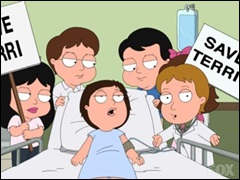
Using the word “vegetable” to describe people with a cognitive disability or impairment is profoundly dehumanizing. The victims of this characterization are as diverse as America: Members of the castigated class come from all races, ages, nationalities, genders, sexual orientations, and any other human identifier one can conjure. Indeed, any one of us could find ourselves entered among this disparaged group, and all of us have—or had—loved ones who could be so identified.
The V-word serves the same purpose as the loathsome N-word: to cast aspersion, debase, and degrade—toward the end that the victims of the epithet be seen as a lower order of being—and hence, as less worthy of respect and equality.
Here’s a vivid example. A few years ago the popular animated television program Family Guy featured its cartoon characters putting on a high school musical that openly mocked the late Terri Schiavo. The episode opens with a fictional school play, Terri Schiavo: The Musical. The lyrics sung by the characters jeer Terri’s memory, and by logical extension, those now living with serious cognitive impairments.
The character playing “Terri” lays in a bed hooked up to every conceivable medical machine (which the real Terri Schiavo did not require). “Michael Schiavo” enters, looks at his wife in the bed and says, “She’s a vegetable.”
The chorus responds enthusiastically, “We hate vegetables!” to which the audience roars with laughter. Later, Terri is depicted as having “mashed potato brains,” which are poured into a bowl, and is described as “the most expensive plant you’ll ever see.”
Can you imagine anything close to that disrespect being directed against a racial minority, the LGBT community, or AIDS patients?
Related
“Imposed Death: A Conference on Stealth Euthanasia” will be held on Saturday, November 9 at Benedictine University in Lisle, IL.
Speakers include Bobby Schindler of the Terri Schiavo Life and Hope Network and Peter Breen of the Thomas More Society. More information is available here.

